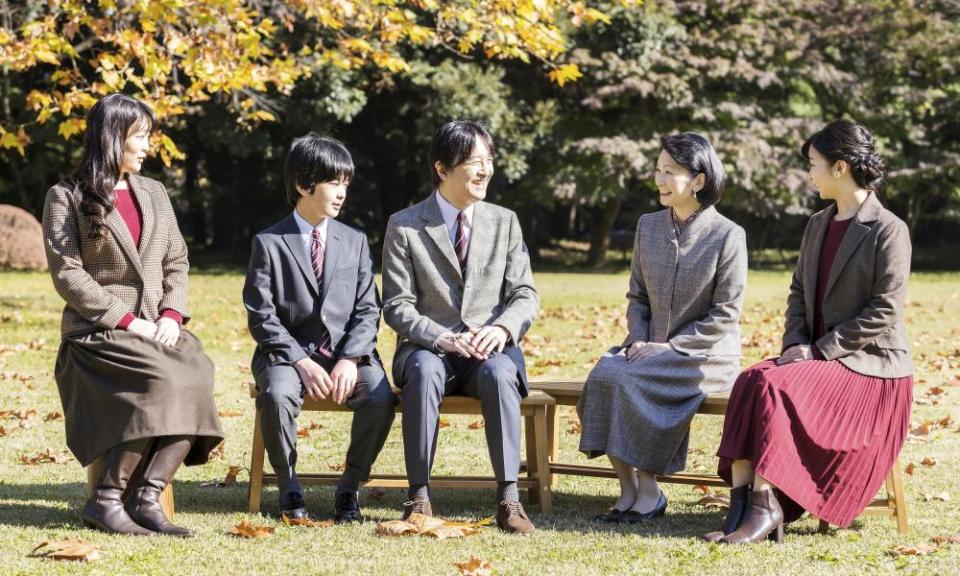Heir of desperation as Japan wrestles with looming royal succession crisis
A panel of experts has begun talks on addressing the shortage of heirs to the Japanese imperial throne, as a poll showed that four in five members of the public are comfortable with the idea of women becoming reigning empresses.
Solving the succession crisis has taken on greater urgency due to a scarcity of males in the world’s oldest monarchy and the abdication, for health reasons, of Emperor Akihito.
Emperor Naruhito, who succeeded his father two years ago, has only one child, 19-year-old Princess Aiko. If she marries a non-royal she would have to leave the imperial family and become an ordinary citizen. Aiko could not become empress and her son could not become emperor without a change in the law.
That leaves two heirs: Naruhito’s brother, Crown Prince Fumihito, 55, and his 14-year-old nephew, Prince Hisahito. Nothing short of catastrophe would see Prince Hitachi – Naruhito’s 85-year-old uncle – become emperor.
The recent controversy surrounding the on-off marriage of Princess Mako – the eldest daughter of Fumihito, who is first in line to the Chrysanthemum throne – has added to pressure to rethink the ban on women becoming regnant empresses.

But changes to the country’s male-only succession laws are unlikely, even though only seven members of the imperial family are below 40, and all but one of them are women. Under the 1947 imperial household law, no female member of the family can become a reigning monarch.
A panel of experts recently appointed by the government has vowed to hold “careful discussions” on a range of options to secure a stable future for the imperial family, including opening up the throne to males born to women who are permitted to remain in the household even after marrying “commoners”.
Divisions have already opened up inside the panel, which is expected to report in the autumn, according to the Mainichi newspaper, which warned that if female members continued to leave the family – as Naruhito’s younger sister did after her marriage in 2005 – “the household could be left with no other members of the same generation as Prince Hisahito”.
The prime minister, Yoshihide Suga, told panel members they were dealing with an issue that “goes to the very foundation of this nation,” but expert say he has little appetite for confronting conservatives in his party who insist on maintaining a patrilineal, male-only succession.
Suga’s predecessor, Shinzo Abe, is to blame for wasting opportunities to secure the imperial family’s future during his eight years in office, according to Hidehiko Kasahara, a professor of Japanese political history at Keio University.
Abe reportedly refused to acknowledge the urgency of the issue, telling experts on a government panel set up in 2016 to plan Akihito’s abdication that no legal changes would be needed for another 40 years given that he has two male heirs, declaring that a “divine wind” would blow when the time came for action.
“The Abe administration must bear responsibility for not tackling the issue during a long period of political stability,” Kasahara told the Kyodo news agency.
While traditionalists in the ruling Liberal Democratic party continue to resist change, reformers will find little resistance among the Japanese public. In a recent poll, 87% were broadly supportive of a reigning empress, while 80% said males from the family’s maternal line should be allowed to become emperor.
Although Japan had eight female monarchs between the sixth and 18th centuries, none was from a female line of descent.
No Japanese administration has shown enthusiasm for revising the male-only succession law since Junichiro Koizumi saw his reform plans come to nothing after the 2006 birth of Hisahito, the first male to be born into the imperial family for 40 years.
His birth gave the family a one-generation reprieve, but if he does not go on to have a son, an unbroken imperial line some claim stretches back 2,600 years risks will be faced with an existential crisis.
Christopher Harding, a senior lecturer in Asian history at Edinburgh University, is cautiously optimistic that the Oxford-educated Naruhito and his wife, Empress Masako – a Harvard graduate and former diplomat – could represent a gentle challenge to the “misguided conservatism” that pervades the Imperial Household Agency, the government body that oversees palace life.
“You have an emperor and empress who were both educated abroad, speak English, and have a track record of dealing pretty robustly with the Imperial Household Agency - often the ‘bad guy’ in terms of excessive traditionalism in the imperial family,” said Harding, who examines Masako’s contribution to the imperial family in his new book.
“Clearly there is great public support for reigning empresses, and maybe at some point someone in the agency or government will come to regard it as an easy PR win.
“That said, I wonder whether enough young Japanese really care enough about the imperial family to be impressed by a change like this. For them, the succession rules may be part and parcel of the imperial family’s general irrelevance in their lives.”

 Yahoo Movies
Yahoo Movies 
